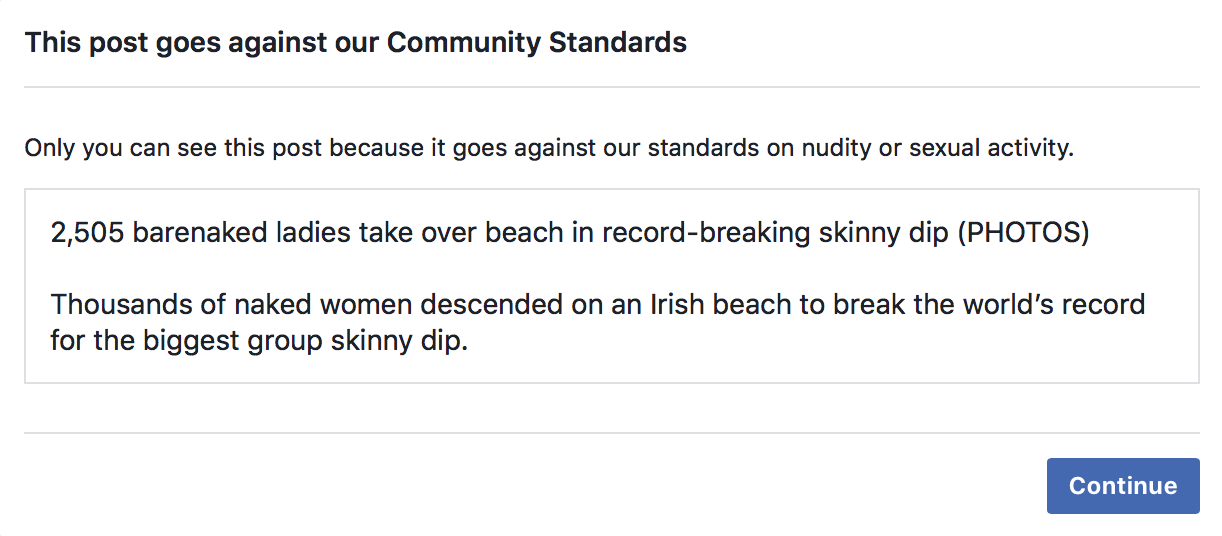Leaving Facebook
 On June 10, 2018, Facebook gave me a time-out. Ostensibly, this was for posting a link to an article about a nude fundraiser in Ireland – to raise funds for “cash-strapped parents of cancer-stricken children visiting [Dublin] for extended hospital stays.” There was nudity, granted. But nude protest, at least, has a venerable history – not that you can teach history to an algorithm that can’t even distinguish a Pulitzer Prize-winning photograph from child pornography (Phan Thị Kim Phúc running from a South Vietnamese napalm attack in 1972). But in my posting, the pictures showed ant-sized people, and it was only a link. I guessed that that would get the point across without making anybody uncomfortable with full frontal or full backal nudity.
On June 10, 2018, Facebook gave me a time-out. Ostensibly, this was for posting a link to an article about a nude fundraiser in Ireland – to raise funds for “cash-strapped parents of cancer-stricken children visiting [Dublin] for extended hospital stays.” There was nudity, granted. But nude protest, at least, has a venerable history – not that you can teach history to an algorithm that can’t even distinguish a Pulitzer Prize-winning photograph from child pornography (Phan Thị Kim Phúc running from a South Vietnamese napalm attack in 1972). But in my posting, the pictures showed ant-sized people, and it was only a link. I guessed that that would get the point across without making anybody uncomfortable with full frontal or full backal nudity.
I was wrong. I was kicked off of Facebook for violating their community standards, or some such nonsense. And, after giving my hiatus some thought (that’s what a time-out is for, right?), I extended my time-out to … forever. And, thinking about and reading about Facebook, I started thinking about Alex Jones.
Yes, Alex Jones, who was de-platformed by Facebook (and Apple and YouTube and Spotify), presumably for violating their community standards, but likely for defaming and endangering the parents of the children killed in the 2012 Sandy Hook Elementary School shooting. The reason doesn’t really matter. That fact that corporations as large and powerful as Facebook could censor – yes, censor – the free speech of a private citizen, should alarm everybody.
But only the government can commit censorship, you say? Facebook is a private corporation and can do what it likes, you say? I used to say this, too. You see, Facebook is not some supermarket community bulletin board: it has more than 2.2 billion monthly active users (as of January 2018); it has a net worth of $190 billion (as of 2016). That’s a lot of power and money. If Facebook decides to do it, you could pretty much disappear – or at least your speech could disappear.
 Although Facebook is a publicly traded, private company, its power is akin to that of a government. It behaves like a public utility, but makes private profits. And that makes me believe that Facebook does not have the right to decide, privately, who gets to speak and who does not, without the transparency you only get from government (ideally). Facebook is, in fact, a monopoly. And as Jimmy Dore pointed out (August 16, 2018, including YouTube and Google), “What we should do is break them up. But we’re not going to do that. So, then what we should do is treat them like a public utility, just like the Internet. You can’t just take someone’s public utility away from them. If you’re AT&T, you can’t just turn off the phone on someone because you don’t like what they’re saying.”
Although Facebook is a publicly traded, private company, its power is akin to that of a government. It behaves like a public utility, but makes private profits. And that makes me believe that Facebook does not have the right to decide, privately, who gets to speak and who does not, without the transparency you only get from government (ideally). Facebook is, in fact, a monopoly. And as Jimmy Dore pointed out (August 16, 2018, including YouTube and Google), “What we should do is break them up. But we’re not going to do that. So, then what we should do is treat them like a public utility, just like the Internet. You can’t just take someone’s public utility away from them. If you’re AT&T, you can’t just turn off the phone on someone because you don’t like what they’re saying.”
Facebook has evolved way beyond a social network to become the closest thing we have to a democratic, public forum. But in the hands of a private company, democracy dies: democracy is bad for business. As Jimmy Dore also points out, “We warned you and we predicted that once censorship starts and everybody’s cool with it, it’s not stopping.” Shutting up Alex Jones was an easy call. But that was the camel’s nose of censorship poking into the tent of democracy. Corporations today are more powerful than governments, if not actually in bed with them and getting the private sector to do what the public sector cannot. And private corporations like Facebook, YouTube and Google should be held to the same standards of public accountability and transparency when it comes to free speech.
Deciding who gets to speak and who doesn’t really is a simple call, but even liberals and progressives get it wrong: you don’t have to like Alex Jones to recognize that there is a vulnerable principle under attack here. Censoring free speech never ends well, as Matt Taibbi pointed out recently. Because if you don’t defend the speech you hate, sooner or later somebody will censor the speech you love.
I no longer love Facebook. I’m done.



I was wondering why I hadn’t seen any of your humorous comments lately. So sad to see you’ve left Facebook, sir. You are missed! 😃😃😃
I LOVED all of your intelligent, thought-provoking posts. Will miss you!!!